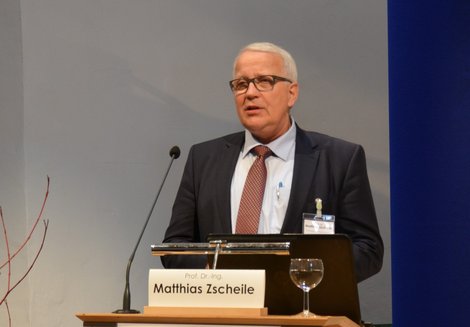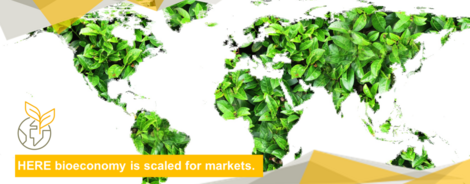Regional Structural Transformation: Reflecting on the Strengths of the Region

The strategies of the “BioZ – Biobased innovations from Zeitz” alliance
A new alliance in the Burgenlandkreis district is linking together the regional strengths of the agriculture, food and chemical industries. The partners in the “BioZ – Biobased innovations from Zeitz” alliance are committed to developing new processes for refining material flows containing starch, sugar, protein or fat in order to manufacture new high-quality products. They are putting the emphasis on efficient processes and value-added networks that use sustainable biobased business methods and on the bioeconomy as the engine of structural transformation.
The joint project, which is based in the former brown coal mining region around Zeitz, has a clear focus. Its aim is to establish a broad-based innovation ecosystem with ideal conditions for the development of innovations, which consists of players from established businesses, start-ups, research and development organizations and networks, the public sector, local clusters and the world of politics. “Our goal is to initiate collaborations across the agriculture, food and chemical industries in order to develop new value-added chains in the bioeconomy,” says Prof. Dr. Matthias Zscheile, head of the BioEconomy Cluster e. V. The leading-edge cluster in Saxony-Anhalt laid the foundations for the “BioZ – Biobased innovations from Zeitz” project, which is one of the 44 German alliance ideas out of a total of 130 that reached the second funding round of the WIR! program. The project, which is currently in its application phase, will begin by creating a concept for a bioeconomic alliance with activities centered around the core Burgenlandkreis district. The nine-month concept phase starts on September 1, 2020.
The acronym WIR! stands for “Wandel durch Innovation in der Region” (transformation through innovation in the region), which is a program initiated by the German Federal Ministry of Education and Research to promote the creation of new regional alliances and to encourage sustainable innovation-based structural transformation. At the launch of the “Innovation and structural transformation” nationwide funding concept, the Ministry explained that the intention is to reach out to specific people in the local area and motivate them to identify and develop the specific strengths and potential of their region.
High concentration of chemical industry complexes
What does this mean for Saxony-Anhalt and the Burgenlandkreis district in particular? This largely rural region, which lies south of the Halle-Leipzig metropolitan area, has a long tradition of brown coal mining. “That will soon come to an end,” says Prof. Dr. Matthias Zscheile. “We need to reflect on our strengths and push ahead with structural change.” He explains that one of the region’s strengths is its fertile soil, which is ideal for growing sugar beets and cereals. The agricultural industry is already organized into efficient supply chains with multi-level upstream and downstream connections between the companies. These businesses in turn form part of value-added networks that include the production of raw material, the refining stages and the end consumers. As Zscheile says: “We have a strong, well-established agricultural industry here with a large amount of expertise and excellent processing skills.” Another feature of the area is the high concentration of chemical industry complexes. The core region is home to major bioethanol production sites and new biorefineries. The alliance can also benefit from bioeconomy clusters that bring together SMEs, start-ups, outstanding research and development institutions and scaling platforms.
Developing new value-added chains
The BioZ project aims to build on all of this and has strategies for doing so. Some of these are still at the ideas stage and others have already been implemented. “Many processors are looking for biobased intermediates that will allow them to supply their customers with future-proof products. Using biological production systems we can convert sugar, starch and other biogenic material flows into high-quality products,” explains Prof. Dr. Matthias Zscheile. The “Biobased innovations from Zeitz” project aims to promote the development of new value-added chains. The founders are inviting partners from the region and from all over Germany to play an active role in the project, make contact with the alliance team and benefit from the ideal conditions in the area.
One of the local strengths is the production of fine and specialty chemicals using new synthesis strategies and processes with moderators, such as catalysts and enzymes, for the conversion of the materials. Other potential fields involve manufacturing functional vegan proteins and enzymes from sugar with the help of efficient fermentation processes, producing degradable biopolymers and plastics based on starch and sugar derivatives and using lactic acid in cost-effective biotechnology synthesis processes. The region also plans to work with new materials and fibers. One example of this is the creation of bacterial cellulose from sugar.
Toward a climate-neutral economy and lifestyle
The development of new biobased materials and fibers offers great potential for innovation. For example, cellulose produced from sugar by bacteria can be used to manufacture textiles with completely new properties, as Professor Matthias Zscheile explains: “The fabric is tearproof, self-extinguishing, resistant to acids and ultra-lightweight. It opens up a wide range of opportunities in the automotive and fashion industries, as a vegan leather substitute and even in battery production as a separator for the capacitors.” ScobyTec, the start-up that developed this new process, was recently recognized for its work at the local IQ Innovation Awards Central Germany in Leipzig. There has also been a particular focus on promoting scalable procedures and networking existing production processes at an early stage. The aim is to move away from fossil fuels and toward a climate-neutral economy and lifestyle based on sustainable raw materials. “As new processes, products and business models are adopted by industry, attractive jobs will be created in the bioeconomy,” says Zscheile and highlights several of the alliance’s USPs. One of these is the raw materials and skills available in the region, where sugar, starch and the resulting by-products and residual waste flows are produced in significant quantities. “The relatively consistent flows of by-products that are regularly produced are ideal for the development of new refining processes and form an interface between the food and chemical industries that offers a great deal of innovation potential, because many of the basic materials are already of food grade quality,” explains Zscheile.
Raising awareness of the biobased economy in the German Science Year
Arguments of this kind make an impact both on the federal government and in the region. From the very beginning the BioZ initiative has attracted a number of players that have familiarized themselves during the outline phase with the alliance’s goals and committed to becoming a part of it. The founders of the alliance, PIC – Pi Innovation Culture GmbH from Leipzig, BioEconomy e. V. from Halle an der Saale and Infra-Zeitz Servicegesellschaft mbh from Zeitz, are currently working with nine partners, including the Fraunhofer Center for Chemical-Biotechnological Processes (CBP) in Leuna, the German Biomass Research Center (BFZ) and the sugar company Südzucker AG in Zeitz. During the concept phase, the alliance will be expanded to involve a minimum of 50 partners. Prof. Dr. Matthias Zscheile says that “all the organizations that have joined are inspired by the vision of increasing the specific strengths and potential of our region in the future. We are on the right track.” He goes on to explain: “In particular in the current German Science Year, which has the theme of the bioeconomy, this will help to raise awareness of the biobased economy.”
Author: Manuela Bock/IMG Saxony-Anhalt
www.bioeconomy.de
www.innovation-strukturwandel.de

Sustainable economic growth requires the responsible use of resources. This is a reality in Saxony-Anhalt: more than half of gross electricity production comes from renewable sources of energy.
> Learn more about bioeconomy in Saxony-Anhalt and the strength of Saxony-Anhalt as a location for bioeconomy.
